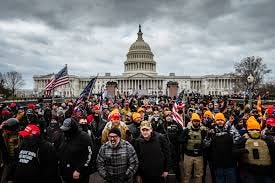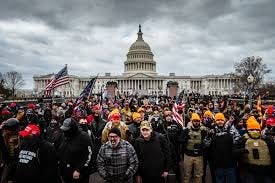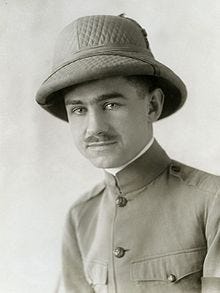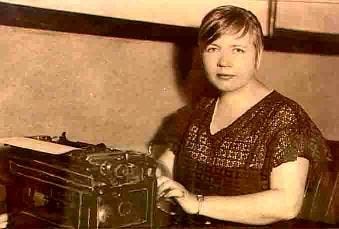An earlier version of this piece appears on my WordPress site. I’m updating it here because the story illustrates history’s habit of repeating itself. It behooves us to be watchful.
I’ve been a fan of Rachel Maddow since her show debuted in 2008. I especially appreciate her trick of pulling odd and seemingly random rabbits out of history’s hat and reconstructing them as a template for thinking about the present. I always find intriguing historical intersections in her work.
“Riot at the Gates (Again)”—the first episode of her 2023 podcast, Deja News—held a special interest for me because of a backstory connection to A Wilder Rose, which I wrote in 2012. In her podcast, Rachel tells the story of the Business Plot, a little-known coup attempt against President Franklin Roosevelt by a cabal that called itself the American Liberty League, a conservative, right-wing coalition of wealthy, powerful Wall Streeters who were desperately afraid of losing their wealth and desperate to hang onto the gold standard.
A Failed Coup
The 1933-34 attempt was foiled by Smedley Darlington Butler, a retired US Marine Corps brigadier general and much-decorated military hero whom the cabal tried to recruit to lead the coup, unseat FDR, and become the titular dictator. The Liberty League had made him a tempting offer: an army of 500,000 men (many of them veterans of the 1932 Bonus Army), with an initial war chest of $3,000,000 (three-quarters of a billion today). What’s more, they would see that he was a shoo-in for president on the GOP ticket in 1936.
But Butler had the Right Stuff. He balked. More importantly, he took his story to Congress. The League, of course, angrily denied it ( “Perfect moonshine! Too unutterably ridiculous to comment on!”) and the American press distorted it, made fun of it, or buried it. But the damage was done. In The Plot to Seize the White House, Jules Archer remarks: “If we remember Major General Smedley Darlington Butler for nothing else, we owe him an eternal debt of gratitude for spurning the chance to become dictator of the United States—and for making damned sure no one else did either.” FDR won by a landslide in 1936, burying the Liberty League’s candidate, Alf Landon, governor of Kansas.
A very interesting story, yes. But what I want to tell you about is the story behind Butler—the story that helped to make him such an appealing coup-meister candidate. This episode took place in the days when military heroes were viewed with passionate public adoration, and Butler was the cream of the crop. His military adventures had been heavily publicized by radio broadcaster Lowell Thomas, who had made it his business to create heroes, beginning with Lawrence of Arabia. The strikingly handsome Thomas made a name for himself by making a name for young T.E. Lawrence, giving popular talks illustrated by the documentary-style film he brought back from the Great War.
Then Thomas expanded his business model. Using a team of ghostwriters, he produced more than a dozen real-life adventure books about other male action figures. His most prominent subject was Smedley Darlington Butler, whose story he called Old Gimlet Eye: The Adventures of Smedley D. Butler. This story of military muscle and victories on the battlefield—Cuba, the Philippines, China, Central America, Haiti, and WWI—was published in the autumn of 1933, just as General Butler was blowing the whistle on the Business Plot. Old Gimlet Eye was a first-person account of Butler’s life and heroic adventures, as told by its author to Lowell Thomas. Except that it wasn’t.
For that’s where Rose Wilder Lane comes into our story. Old Gimlet Eye wasn’t “told to” Lowell Thomas, it was “told to” Rose, the ghostwriter Thomas hired to do the job.
If you’ve read A Wilder Rose (the first in my series of biographical novels about back-stage women) you will remember Rose as the unacknowledged co-author of her mother’s eight Little House books, published (1932-1943) under the name of Laura Ingalls Wilder. Rose also worked, profitably, as one of the ghostwriters on Lowell Thomas’ publicity team.
She and Thomas likely connected through Elsie Weil at Asia magazine in November, 1931. In her unpublished journal, Rose writes that she was staying at the Westport, Connecticut, home of Sinclair Lewis and his wife Dorothy Thompson, a journalist and Rose’s longtime friend. Lewis had won the 1930 Nobel Prize for Literature; Dorothy wanted to go to Sweden with him and asked Rose to mind the Sinclair household, which included their six-month-old baby. Rose spent the months of December and January on Old Gimlet Eye, writing from the source material Butler provided via Thomas.
Rose ghostwrote five more adventure-hero books for Thomas, earning $1,000 a book ($20k today). She admired bold adventurers and entrepreneurs like Thomas. And she would certainly have admired the General, who had that unmistakable star quality and was an outspoken anti-fascist to boot. After Rose gave him a good burnishing in Old Gimlet Eye, he shone even brighter. Bright enough to attract a coup offer—and smart enough to turn it down.
Another Failed Coup
American political history features another attempted coup, this one fictional but entangled with and reflecting a grim and tragic reality. Seven Days in May is the tale of an attempted right-wing coup by the Joint Chiefs of Staffs, against liberal President Jordan Lyman, who is intent on establishing a nuclear arms treaty with the Russians. It was written by a pair of journalists, Fletcher Knebel and Charles W. Bailey, and inspired by Knebel’s interview with General Curtis LeMay, the architect of the air war that defeated Japan and saber-rattling boss of the Strategic Air Command. The political thriller, published by Harper & Row in 1962, stayed on the bestseller lists for months in 1962-63.
President John F. Kennedy read the book when it came out and was evidently impressed by its scary this-really-could-happen-here realism. He must have bitterly recalled the Bay of Pigs, just a year before, when the Joint Chiefs (“those sons-of-bitches”) and “those CIA bastards” who humiliatingly set him up for a military disaster. His contempt for the Chiefs and the CIA would become even more intense in October that year, fueled by their intense pressure to bomb Cuban missile sites, invade the island, and bring down the Castro government, strategies we now know would have triggered nuclear retaliation. He began to frame more urgent efforts toward peace, leading to his historic American University speech in June, 1963. He must have seen himself in the fictional President Lyman, who had brokered a treaty with the Russians.
JFK had already encouraged filmmaker John Frankenheimer, a close friend, to make The Manchurian Candidate, a cold-war thriller in which a brainwashed assassin targets a presidential candidate. Now, he let Frankenheimer know that he’d like to see Seven Days in May as a movie. Frankenheimer bought the film rights in late October, 1962, just a few days after the Cuban Missile Crisis ended. The cast was all stars: Frederick March as President Lyman; Kirk Douglas as Jiggs, the Marine colonel who sniffed out the plot; and Burt Lancaster as the powerful Brigadier General James Mattoon Scott, the chairman of the Joint Chiefs and the coup’s mastermind.
The production went incredibly smoothly—two weeks of rehearsals, just fifty days of shooting, August 12 to November 5, 1963. The film was in post-production on November 22 when the president was assassinated—by a single gunman, operating alone, we were told. Shortly, that gunman was dead. Don’t worry, they said. Nothing to see here. Go back to what you’re doing.
But what to do about the movie? The film was scheduled for release on February 12, 1964, just 12 weeks after the president’s assassination. But Paramount (the distributor) had cold feet and argued for delay. Frankenheimer, devastated by his friend’s murder, insisted on the scheduled release. When it came out, I was a young mom and a college student without much sense of history or politics. But when I saw it, there were so many parallels to the situation we had just lived through that I was persuaded (and still am, 60 years later) that there was more to JFK’s murder than one guy with a gun. It was a coup attempt. Later, that feeling was heightened by Oliver Stone’s 1992 movie, JFK. Fiction and film can make the real world sharper and clearer and easier to see.
We have come quite a distance from Rachel’s podcast, where she uses Smedley Butler to make the important point that the January 6 coup attempt was not the first in American history. It’s the second, she reminds us.
And maybe the third. In any case, it’s always worth looking into the stories behind the story.
There is one, always. And it’s not what you think.
Everyone, thanks for reading! More . .
Let’s remember that an attempt to win an election—by any means other than the ballot box—is an attempted coup.
If you’re interested in learning what’s turned up recently in the continuing pursuit of the real story behind JFK’s assassination, check out JFK Facts, here on Substack.
If you’re interested in Rose, the original version of this essay includes more, here. You might also like A Wilder Rose or The Ghost in the Little House: A Life of Rose Wilder Lane, by William Holtz.
Look for me again on Thursday, Aug 22, with the Virgo issue of Growing Green with the Zodiac, the first in a new series.
Supporting subscribers, your comment or question will enter you in the August Book Bundle drawing. Your issue of Growing Green will include a workbook—eager to hear what you think of it.










Wow -- the story behind the story. Somehow I take comfort in knowing that coup attempts were not just D. Trump's power play. Knowing that we've survived these things before gives me hope that we can survive them again. And it's a good reminder that anyone messing with election results is, in fact, attempting a coup. When Kamala Harris wins the 2024 election (and I do believe she will) there will be all kinds of noise from the other side about election interference, but I believe we're equipped to deal with it. The American spirit is strong and people are exhausted from the ugliness and lies of those who would try to burn it all down. Thank you for this very informative and inspiring piece, Susan. It helps to know the story behind the story -- to know that there will always be those who get drunk on the idea of seizing and keeping power. Thus,I return to my statement: "the American spirit is strong." We have a good and fighting chance to keep freedom and democracy alive.
I know it's cheating but could I just ditto the long list of thanks for your important story about the story behind the story? I've already shared with friends. We went to a well organized 100+person gathering this weekend to meet and get to know our local and state candidates. Let's keep on keeping on. Eyes open.